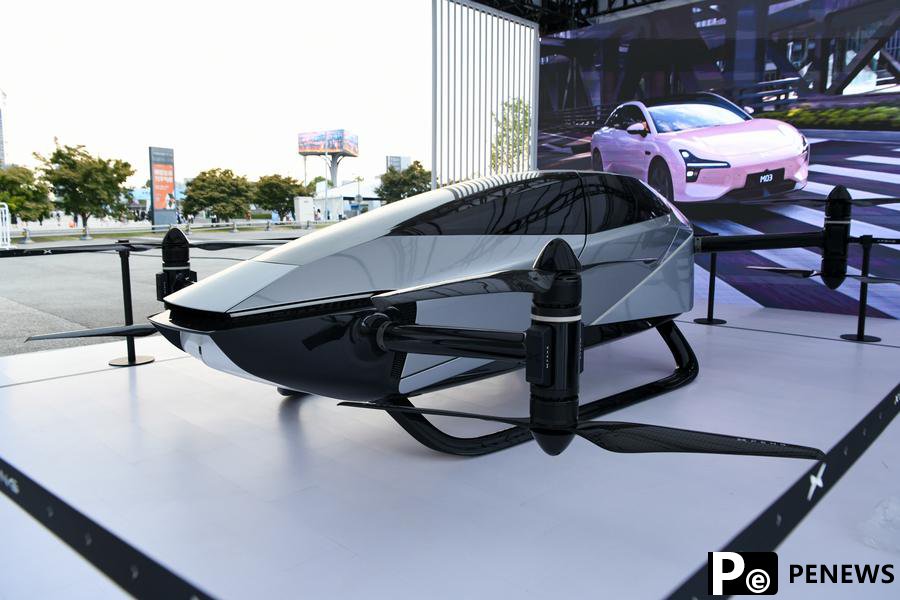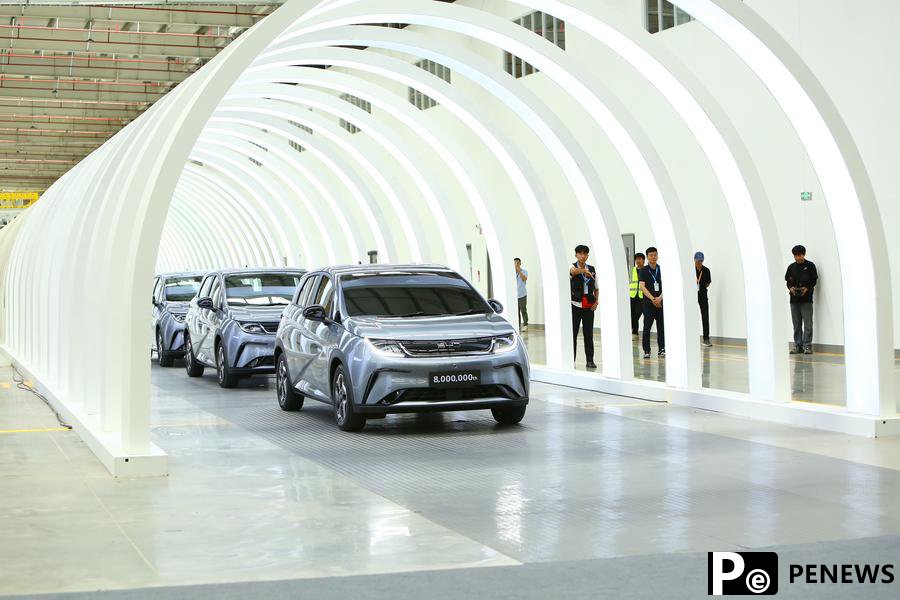Home>>
China's thriving EV industry takes green innovation global(Xinhua) 08:11, September 10, 2024
CHENGDU, China, Sept. 9 (Xinhua) -- Gliding effortlessly through 1.6-meter deep water, an electric vehicle (EV) navigating the pool amazed onlookers with its impressive capabilities. Nearby, a flying car resembling a large drone hovered overhead, mesmerizing the crowd below.
These cutting-edge vehicles and technologies were showcased here at the 10-day Chengdu Motor Show 2024 in southwest China's Sichuan Province, drawing car enthusiasts from around the globe to experience the latest innovations.
"The development potential of China's EV market is unlimited," Mark Rainford, founder of the YouTube channel Inside China Auto, told Xinhua at the motor show. "There's no market anywhere in the world for EVs like China right now, and as those cars make their way to every corner of the world, they'll drive innovation there too by default."
SETTING SAIL FROM HOME
From Aug. 30 to Sept. 8, about 130 Chinese and foreign car companies participated in the motor show, displaying over 1,600 vehicles. On the opening day, 63 brand press conferences unveiled 73 new models, including 27 new models making their global debut.
These vehicles ranged from new energy-intelligent connected cars and plug-in hybrids to high-performance luxury sedans and striking concept cars. This diverse array of innovations provided a vivid snapshot of the Chinese automotive industry's exploration and vision for the future of mobility, presenting customers with a wide range of choices.

An Xpeng X2 flying car is on display during Chengdu Motor Show 2024 in Chengdu, southwest China's Sichuan Province, Aug. 30, 2024. (Xinhua/Tang Wenhao)
"Today's EVs are smarter, more economical, and eco-friendly. I'm considering buying one for my family. Plus, features like voice commands and in-car entertainment really make my kids happy," Ms Shuai, a visitor at the show, told Xinhua.
Shuai's decision reflects a broader trend among Chinese consumers. In July, the retail penetration rate of new energy vehicles (NEVs) in China exceeded 50 percent for the first time, reaching 51.1 percent. This milestone marks a shift in the Chinese automotive market, with NEVs officially surpassing traditional fuel-powered cars to become the new mainstream, signaling a new phase of industry development.
Today, both EVs and traditional fuel-powered cars are evolving toward greater digitization, connectivity, and intelligence. Noting that the NEV industry is at a pivotal stage of development, Lu Fang, CEO of Chinese NEV brand Voyah, said that the key transformation underway is "the shift from standard NEVs to intelligent, connected ones."
The leap in smart technology by Chinese automakers not only meets the demands of the domestic market but also paves the way for their expansion into international markets, said Kurt Bachmaier, vice president of sales and marketing of Magna Steyr, an automobile manufacturer based in Austria.
"The electrification of the Chinese auto market is now leading the world," said Kajikawa Shinya, vice president of GAC Toyota Motor Co., Ltd.
WORKING IN TANDEM
In 2023, China exported 4.91 million vehicles, marking a year-on-year growth of 57.9 percent. Among these, 1.203 million were NEVs, representing a 77.6 percent increase. This milestone establishes China as the world's largest automobile exporter for the first time, highlighting that China's NEVs are earning strong recognition both at home and abroad.
Talking about the advantages of Chinese NEVs in the global market, Qin Lihong, co-founder and president of Chinese EV maker NIO highlighted China's well-established supply chain and abundant engineering talent, enabling domestic companies to respond quickly to market demands. Additionally, Chinese NEVs excel in intelligence and user experience, making them highly competitive in the market.
According to statistics from the Thai Automotive Industry Association, in 2023, the total number of registered EVs in Thailand reached approximately 76,000, accounting for 12 percent of all vehicle registrations. Notably, Chinese brands dominated the top four positions, and eight of the top 10 spots were also held by Chinese brands.
From exporting complete vehicles to building factories and establishing a presence locally, bringing benefits to local communities, China's NEVs are venturing further.
This year, Chinese carmaker BYD's factory in Thailand, regarded as a key automotive production hub in Southeast Asia, was officially completed and began production on July 4, with an annual capacity of about 150,000 vehicles.

New energy vehicles are displayed at the inauguration ceremony of BYD's new plant in Rayong province, Thailand on July 4, 2024. (Xinhua/Sun Weitong)








